PSY235: Developmental Psychology - Impact of Overprotective Parenting
VerifiedAdded on 2023/06/04
|8
|2300
|435
Literature Review
AI Summary
This paper provides a comprehensive review of authoritarian or overprotective parenting and its impact on child development. It defines authoritarian parenting as a strict style characterized by high demands and low responsiveness, leading to limited open communication between parents and children. The review discusses the adverse effects of this parenting style, including stifled intellectual growth, low self-esteem, shyness, fearfulness, and difficulties in social situations. It also highlights how constant parental intervention, even through mobile phones, can hinder a child's independence and reasoning abilities. The paper concludes that while parents may justify their overprotective nature as a means of guiding their children, it can ultimately stunt their psychological and mental development, potentially leading to problems in adulthood. The paper suggests counseling for overly involved parents to foster greater independence in their children. Desklib offers this and many other assignments for students.
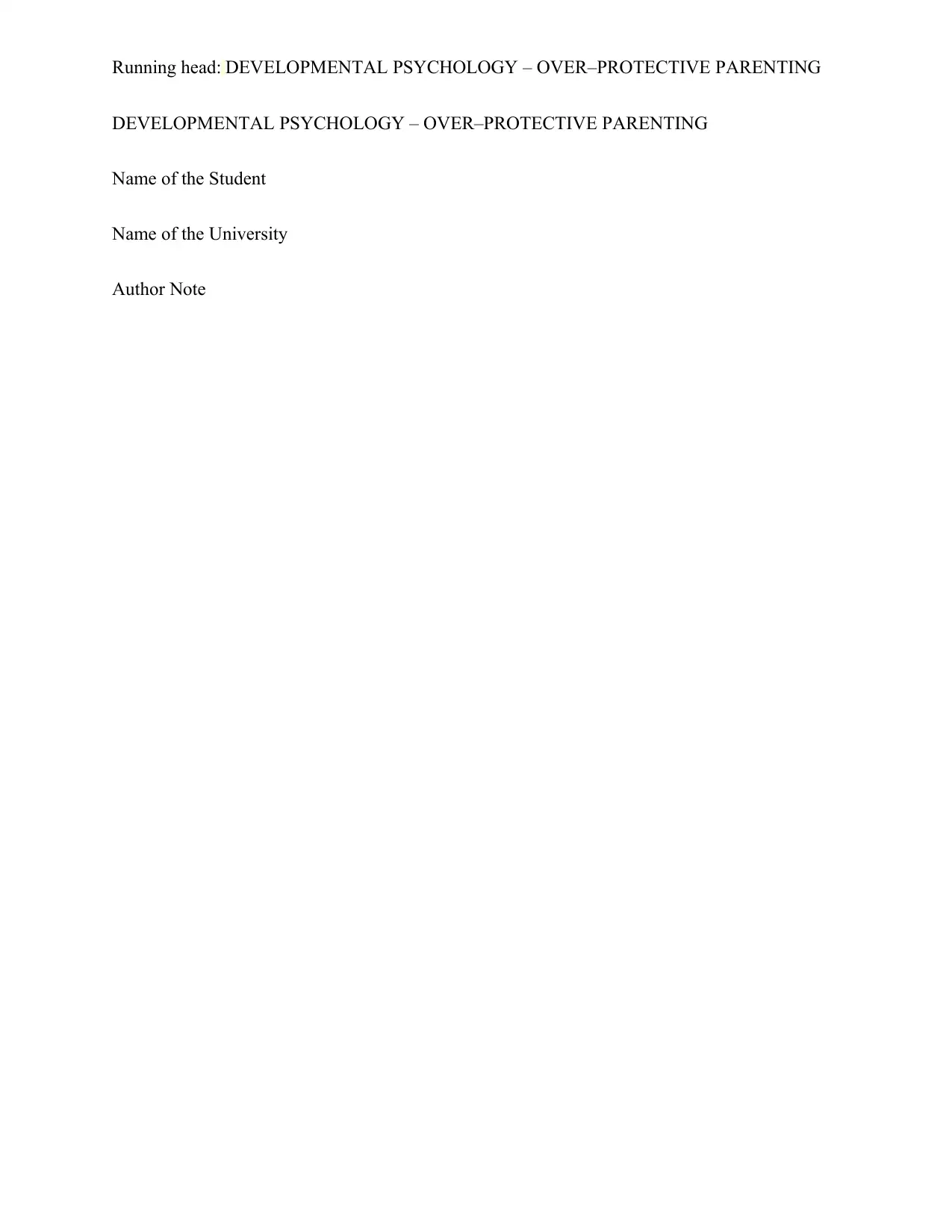
Running head: DEVELOPMENTAL PSYCHOLOGY – OVER–PROTECTIVE PARENTING
DEVELOPMENTAL PSYCHOLOGY – OVER–PROTECTIVE PARENTING
Name of the Student
Name of the University
Author Note
DEVELOPMENTAL PSYCHOLOGY – OVER–PROTECTIVE PARENTING
Name of the Student
Name of the University
Author Note
Paraphrase This Document
Need a fresh take? Get an instant paraphrase of this document with our AI Paraphraser
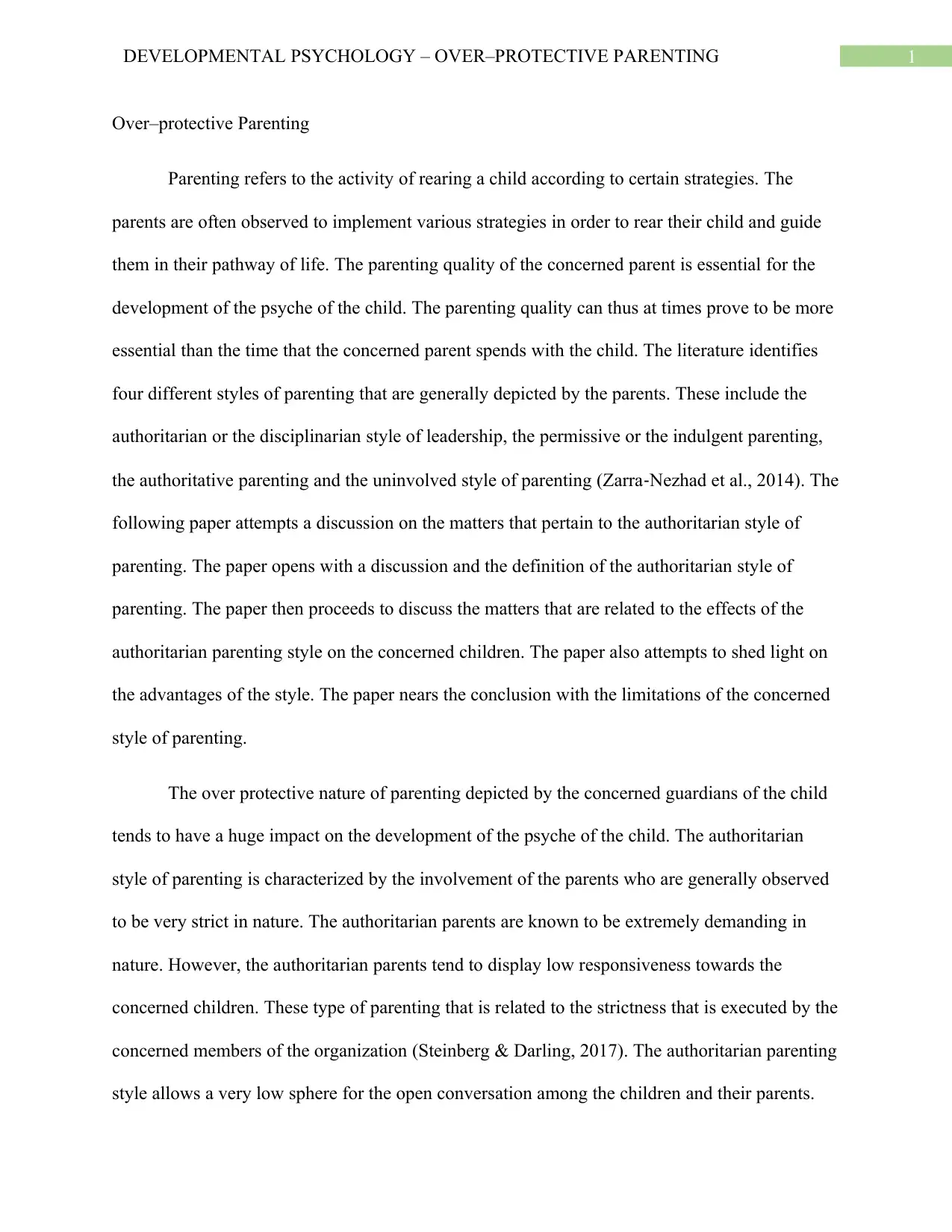
1DEVELOPMENTAL PSYCHOLOGY – OVER–PROTECTIVE PARENTING
Over–protective Parenting
Parenting refers to the activity of rearing a child according to certain strategies. The
parents are often observed to implement various strategies in order to rear their child and guide
them in their pathway of life. The parenting quality of the concerned parent is essential for the
development of the psyche of the child. The parenting quality can thus at times prove to be more
essential than the time that the concerned parent spends with the child. The literature identifies
four different styles of parenting that are generally depicted by the parents. These include the
authoritarian or the disciplinarian style of leadership, the permissive or the indulgent parenting,
the authoritative parenting and the uninvolved style of parenting (Zarra‐Nezhad et al., 2014). The
following paper attempts a discussion on the matters that pertain to the authoritarian style of
parenting. The paper opens with a discussion and the definition of the authoritarian style of
parenting. The paper then proceeds to discuss the matters that are related to the effects of the
authoritarian parenting style on the concerned children. The paper also attempts to shed light on
the advantages of the style. The paper nears the conclusion with the limitations of the concerned
style of parenting.
The over protective nature of parenting depicted by the concerned guardians of the child
tends to have a huge impact on the development of the psyche of the child. The authoritarian
style of parenting is characterized by the involvement of the parents who are generally observed
to be very strict in nature. The authoritarian parents are known to be extremely demanding in
nature. However, the authoritarian parents tend to display low responsiveness towards the
concerned children. These type of parenting that is related to the strictness that is executed by the
concerned members of the organization (Steinberg & Darling, 2017). The authoritarian parenting
style allows a very low sphere for the open conversation among the children and their parents.
Over–protective Parenting
Parenting refers to the activity of rearing a child according to certain strategies. The
parents are often observed to implement various strategies in order to rear their child and guide
them in their pathway of life. The parenting quality of the concerned parent is essential for the
development of the psyche of the child. The parenting quality can thus at times prove to be more
essential than the time that the concerned parent spends with the child. The literature identifies
four different styles of parenting that are generally depicted by the parents. These include the
authoritarian or the disciplinarian style of leadership, the permissive or the indulgent parenting,
the authoritative parenting and the uninvolved style of parenting (Zarra‐Nezhad et al., 2014). The
following paper attempts a discussion on the matters that pertain to the authoritarian style of
parenting. The paper opens with a discussion and the definition of the authoritarian style of
parenting. The paper then proceeds to discuss the matters that are related to the effects of the
authoritarian parenting style on the concerned children. The paper also attempts to shed light on
the advantages of the style. The paper nears the conclusion with the limitations of the concerned
style of parenting.
The over protective nature of parenting depicted by the concerned guardians of the child
tends to have a huge impact on the development of the psyche of the child. The authoritarian
style of parenting is characterized by the involvement of the parents who are generally observed
to be very strict in nature. The authoritarian parents are known to be extremely demanding in
nature. However, the authoritarian parents tend to display low responsiveness towards the
concerned children. These type of parenting that is related to the strictness that is executed by the
concerned members of the organization (Steinberg & Darling, 2017). The authoritarian parenting
style allows a very low sphere for the open conversation among the children and their parents.
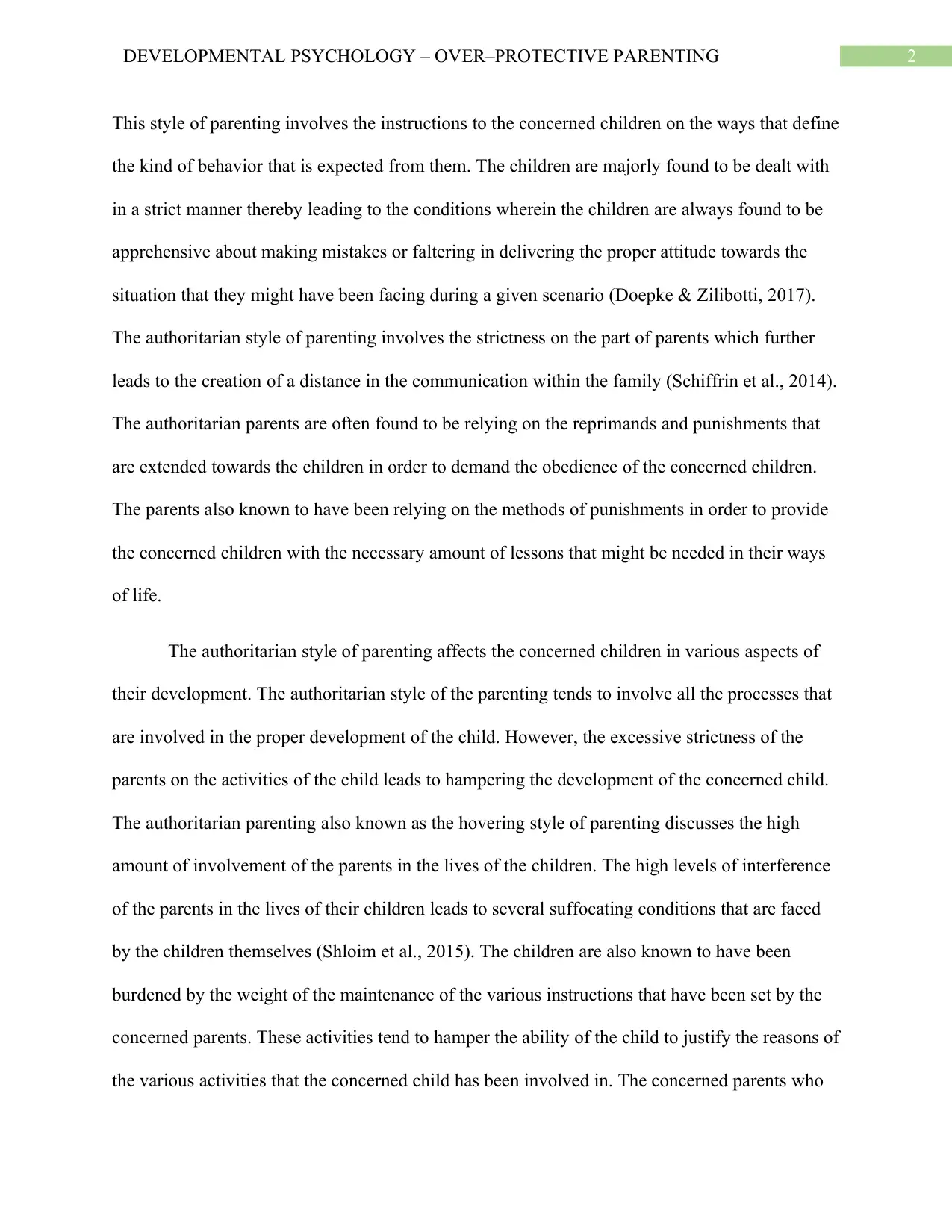
2DEVELOPMENTAL PSYCHOLOGY – OVER–PROTECTIVE PARENTING
This style of parenting involves the instructions to the concerned children on the ways that define
the kind of behavior that is expected from them. The children are majorly found to be dealt with
in a strict manner thereby leading to the conditions wherein the children are always found to be
apprehensive about making mistakes or faltering in delivering the proper attitude towards the
situation that they might have been facing during a given scenario (Doepke & Zilibotti, 2017).
The authoritarian style of parenting involves the strictness on the part of parents which further
leads to the creation of a distance in the communication within the family (Schiffrin et al., 2014).
The authoritarian parents are often found to be relying on the reprimands and punishments that
are extended towards the children in order to demand the obedience of the concerned children.
The parents also known to have been relying on the methods of punishments in order to provide
the concerned children with the necessary amount of lessons that might be needed in their ways
of life.
The authoritarian style of parenting affects the concerned children in various aspects of
their development. The authoritarian style of the parenting tends to involve all the processes that
are involved in the proper development of the child. However, the excessive strictness of the
parents on the activities of the child leads to hampering the development of the concerned child.
The authoritarian parenting also known as the hovering style of parenting discusses the high
amount of involvement of the parents in the lives of the children. The high levels of interference
of the parents in the lives of their children leads to several suffocating conditions that are faced
by the children themselves (Shloim et al., 2015). The children are also known to have been
burdened by the weight of the maintenance of the various instructions that have been set by the
concerned parents. These activities tend to hamper the ability of the child to justify the reasons of
the various activities that the concerned child has been involved in. The concerned parents who
This style of parenting involves the instructions to the concerned children on the ways that define
the kind of behavior that is expected from them. The children are majorly found to be dealt with
in a strict manner thereby leading to the conditions wherein the children are always found to be
apprehensive about making mistakes or faltering in delivering the proper attitude towards the
situation that they might have been facing during a given scenario (Doepke & Zilibotti, 2017).
The authoritarian style of parenting involves the strictness on the part of parents which further
leads to the creation of a distance in the communication within the family (Schiffrin et al., 2014).
The authoritarian parents are often found to be relying on the reprimands and punishments that
are extended towards the children in order to demand the obedience of the concerned children.
The parents also known to have been relying on the methods of punishments in order to provide
the concerned children with the necessary amount of lessons that might be needed in their ways
of life.
The authoritarian style of parenting affects the concerned children in various aspects of
their development. The authoritarian style of the parenting tends to involve all the processes that
are involved in the proper development of the child. However, the excessive strictness of the
parents on the activities of the child leads to hampering the development of the concerned child.
The authoritarian parenting also known as the hovering style of parenting discusses the high
amount of involvement of the parents in the lives of the children. The high levels of interference
of the parents in the lives of their children leads to several suffocating conditions that are faced
by the children themselves (Shloim et al., 2015). The children are also known to have been
burdened by the weight of the maintenance of the various instructions that have been set by the
concerned parents. These activities tend to hamper the ability of the child to justify the reasons of
the various activities that the concerned child has been involved in. The concerned parents who
⊘ This is a preview!⊘
Do you want full access?
Subscribe today to unlock all pages.

Trusted by 1+ million students worldwide
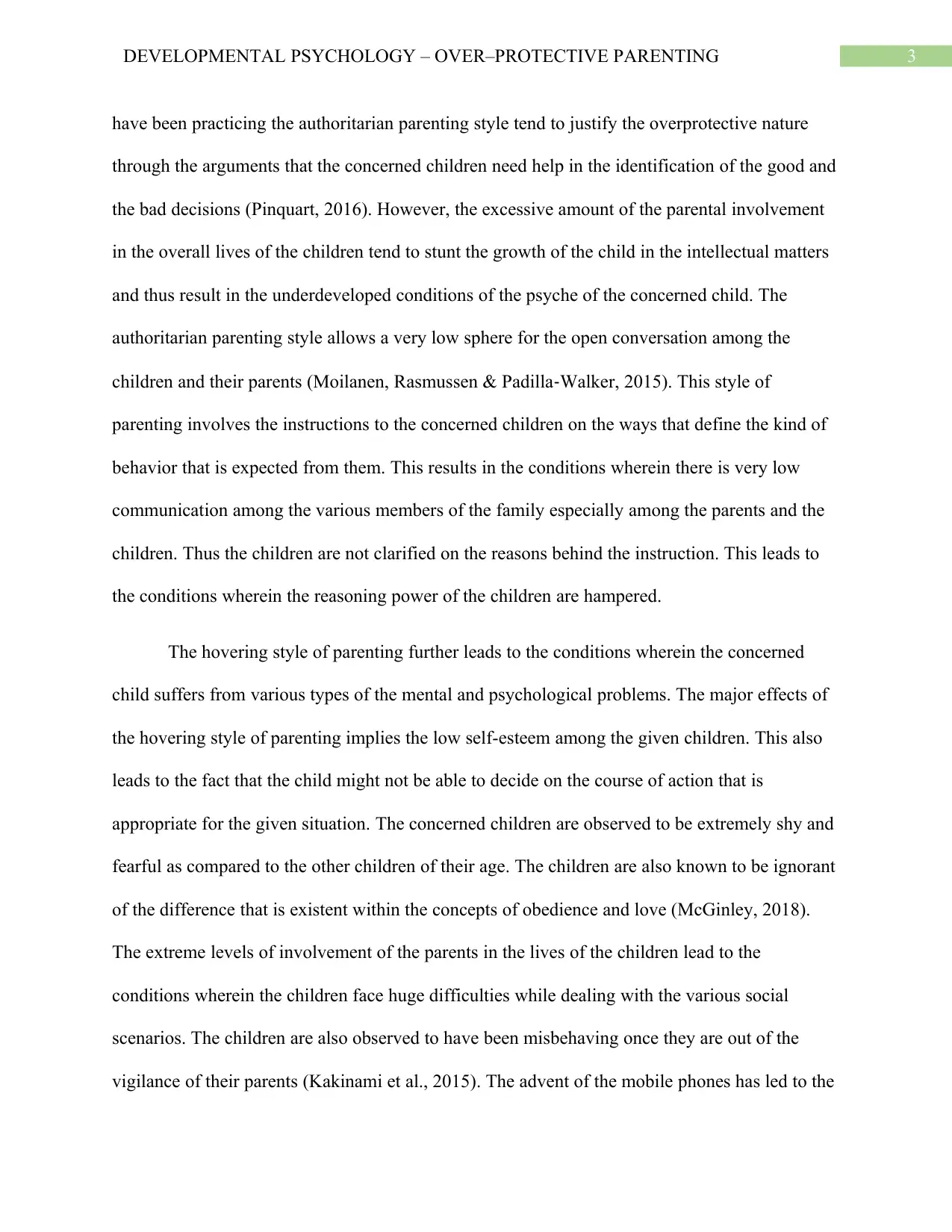
3DEVELOPMENTAL PSYCHOLOGY – OVER–PROTECTIVE PARENTING
have been practicing the authoritarian parenting style tend to justify the overprotective nature
through the arguments that the concerned children need help in the identification of the good and
the bad decisions (Pinquart, 2016). However, the excessive amount of the parental involvement
in the overall lives of the children tend to stunt the growth of the child in the intellectual matters
and thus result in the underdeveloped conditions of the psyche of the concerned child. The
authoritarian parenting style allows a very low sphere for the open conversation among the
children and their parents (Moilanen, Rasmussen & Padilla‐Walker, 2015). This style of
parenting involves the instructions to the concerned children on the ways that define the kind of
behavior that is expected from them. This results in the conditions wherein there is very low
communication among the various members of the family especially among the parents and the
children. Thus the children are not clarified on the reasons behind the instruction. This leads to
the conditions wherein the reasoning power of the children are hampered.
The hovering style of parenting further leads to the conditions wherein the concerned
child suffers from various types of the mental and psychological problems. The major effects of
the hovering style of parenting implies the low self-esteem among the given children. This also
leads to the fact that the child might not be able to decide on the course of action that is
appropriate for the given situation. The concerned children are observed to be extremely shy and
fearful as compared to the other children of their age. The children are also known to be ignorant
of the difference that is existent within the concepts of obedience and love (McGinley, 2018).
The extreme levels of involvement of the parents in the lives of the children lead to the
conditions wherein the children face huge difficulties while dealing with the various social
scenarios. The children are also observed to have been misbehaving once they are out of the
vigilance of their parents (Kakinami et al., 2015). The advent of the mobile phones has led to the
have been practicing the authoritarian parenting style tend to justify the overprotective nature
through the arguments that the concerned children need help in the identification of the good and
the bad decisions (Pinquart, 2016). However, the excessive amount of the parental involvement
in the overall lives of the children tend to stunt the growth of the child in the intellectual matters
and thus result in the underdeveloped conditions of the psyche of the concerned child. The
authoritarian parenting style allows a very low sphere for the open conversation among the
children and their parents (Moilanen, Rasmussen & Padilla‐Walker, 2015). This style of
parenting involves the instructions to the concerned children on the ways that define the kind of
behavior that is expected from them. This results in the conditions wherein there is very low
communication among the various members of the family especially among the parents and the
children. Thus the children are not clarified on the reasons behind the instruction. This leads to
the conditions wherein the reasoning power of the children are hampered.
The hovering style of parenting further leads to the conditions wherein the concerned
child suffers from various types of the mental and psychological problems. The major effects of
the hovering style of parenting implies the low self-esteem among the given children. This also
leads to the fact that the child might not be able to decide on the course of action that is
appropriate for the given situation. The concerned children are observed to be extremely shy and
fearful as compared to the other children of their age. The children are also known to be ignorant
of the difference that is existent within the concepts of obedience and love (McGinley, 2018).
The extreme levels of involvement of the parents in the lives of the children lead to the
conditions wherein the children face huge difficulties while dealing with the various social
scenarios. The children are also observed to have been misbehaving once they are out of the
vigilance of their parents (Kakinami et al., 2015). The advent of the mobile phones has led to the
Paraphrase This Document
Need a fresh take? Get an instant paraphrase of this document with our AI Paraphraser
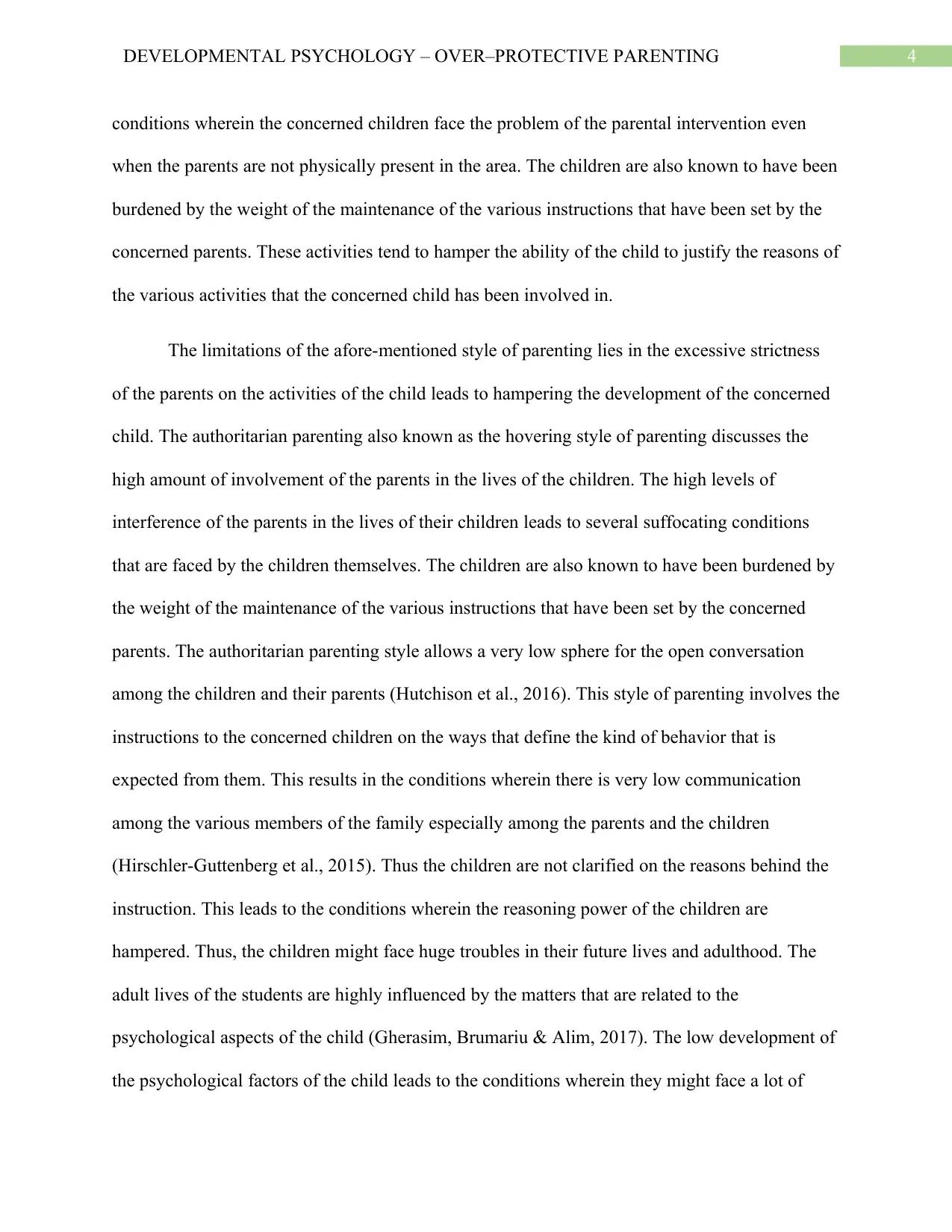
4DEVELOPMENTAL PSYCHOLOGY – OVER–PROTECTIVE PARENTING
conditions wherein the concerned children face the problem of the parental intervention even
when the parents are not physically present in the area. The children are also known to have been
burdened by the weight of the maintenance of the various instructions that have been set by the
concerned parents. These activities tend to hamper the ability of the child to justify the reasons of
the various activities that the concerned child has been involved in.
The limitations of the afore-mentioned style of parenting lies in the excessive strictness
of the parents on the activities of the child leads to hampering the development of the concerned
child. The authoritarian parenting also known as the hovering style of parenting discusses the
high amount of involvement of the parents in the lives of the children. The high levels of
interference of the parents in the lives of their children leads to several suffocating conditions
that are faced by the children themselves. The children are also known to have been burdened by
the weight of the maintenance of the various instructions that have been set by the concerned
parents. The authoritarian parenting style allows a very low sphere for the open conversation
among the children and their parents (Hutchison et al., 2016). This style of parenting involves the
instructions to the concerned children on the ways that define the kind of behavior that is
expected from them. This results in the conditions wherein there is very low communication
among the various members of the family especially among the parents and the children
(Hirschler-Guttenberg et al., 2015). Thus the children are not clarified on the reasons behind the
instruction. This leads to the conditions wherein the reasoning power of the children are
hampered. Thus, the children might face huge troubles in their future lives and adulthood. The
adult lives of the students are highly influenced by the matters that are related to the
psychological aspects of the child (Gherasim, Brumariu & Alim, 2017). The low development of
the psychological factors of the child leads to the conditions wherein they might face a lot of
conditions wherein the concerned children face the problem of the parental intervention even
when the parents are not physically present in the area. The children are also known to have been
burdened by the weight of the maintenance of the various instructions that have been set by the
concerned parents. These activities tend to hamper the ability of the child to justify the reasons of
the various activities that the concerned child has been involved in.
The limitations of the afore-mentioned style of parenting lies in the excessive strictness
of the parents on the activities of the child leads to hampering the development of the concerned
child. The authoritarian parenting also known as the hovering style of parenting discusses the
high amount of involvement of the parents in the lives of the children. The high levels of
interference of the parents in the lives of their children leads to several suffocating conditions
that are faced by the children themselves. The children are also known to have been burdened by
the weight of the maintenance of the various instructions that have been set by the concerned
parents. The authoritarian parenting style allows a very low sphere for the open conversation
among the children and their parents (Hutchison et al., 2016). This style of parenting involves the
instructions to the concerned children on the ways that define the kind of behavior that is
expected from them. This results in the conditions wherein there is very low communication
among the various members of the family especially among the parents and the children
(Hirschler-Guttenberg et al., 2015). Thus the children are not clarified on the reasons behind the
instruction. This leads to the conditions wherein the reasoning power of the children are
hampered. Thus, the children might face huge troubles in their future lives and adulthood. The
adult lives of the students are highly influenced by the matters that are related to the
psychological aspects of the child (Gherasim, Brumariu & Alim, 2017). The low development of
the psychological factors of the child leads to the conditions wherein they might face a lot of
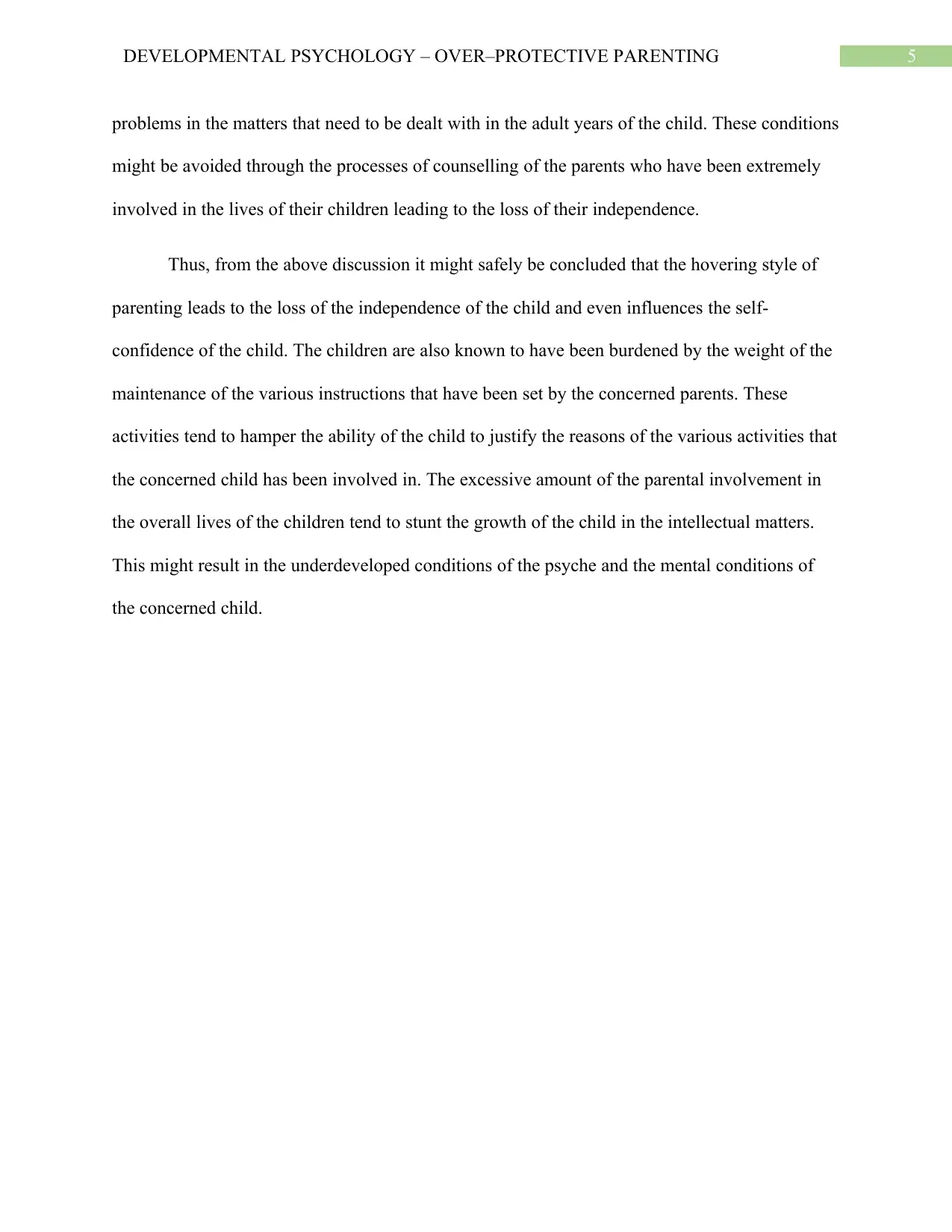
5DEVELOPMENTAL PSYCHOLOGY – OVER–PROTECTIVE PARENTING
problems in the matters that need to be dealt with in the adult years of the child. These conditions
might be avoided through the processes of counselling of the parents who have been extremely
involved in the lives of their children leading to the loss of their independence.
Thus, from the above discussion it might safely be concluded that the hovering style of
parenting leads to the loss of the independence of the child and even influences the self-
confidence of the child. The children are also known to have been burdened by the weight of the
maintenance of the various instructions that have been set by the concerned parents. These
activities tend to hamper the ability of the child to justify the reasons of the various activities that
the concerned child has been involved in. The excessive amount of the parental involvement in
the overall lives of the children tend to stunt the growth of the child in the intellectual matters.
This might result in the underdeveloped conditions of the psyche and the mental conditions of
the concerned child.
problems in the matters that need to be dealt with in the adult years of the child. These conditions
might be avoided through the processes of counselling of the parents who have been extremely
involved in the lives of their children leading to the loss of their independence.
Thus, from the above discussion it might safely be concluded that the hovering style of
parenting leads to the loss of the independence of the child and even influences the self-
confidence of the child. The children are also known to have been burdened by the weight of the
maintenance of the various instructions that have been set by the concerned parents. These
activities tend to hamper the ability of the child to justify the reasons of the various activities that
the concerned child has been involved in. The excessive amount of the parental involvement in
the overall lives of the children tend to stunt the growth of the child in the intellectual matters.
This might result in the underdeveloped conditions of the psyche and the mental conditions of
the concerned child.
⊘ This is a preview!⊘
Do you want full access?
Subscribe today to unlock all pages.

Trusted by 1+ million students worldwide
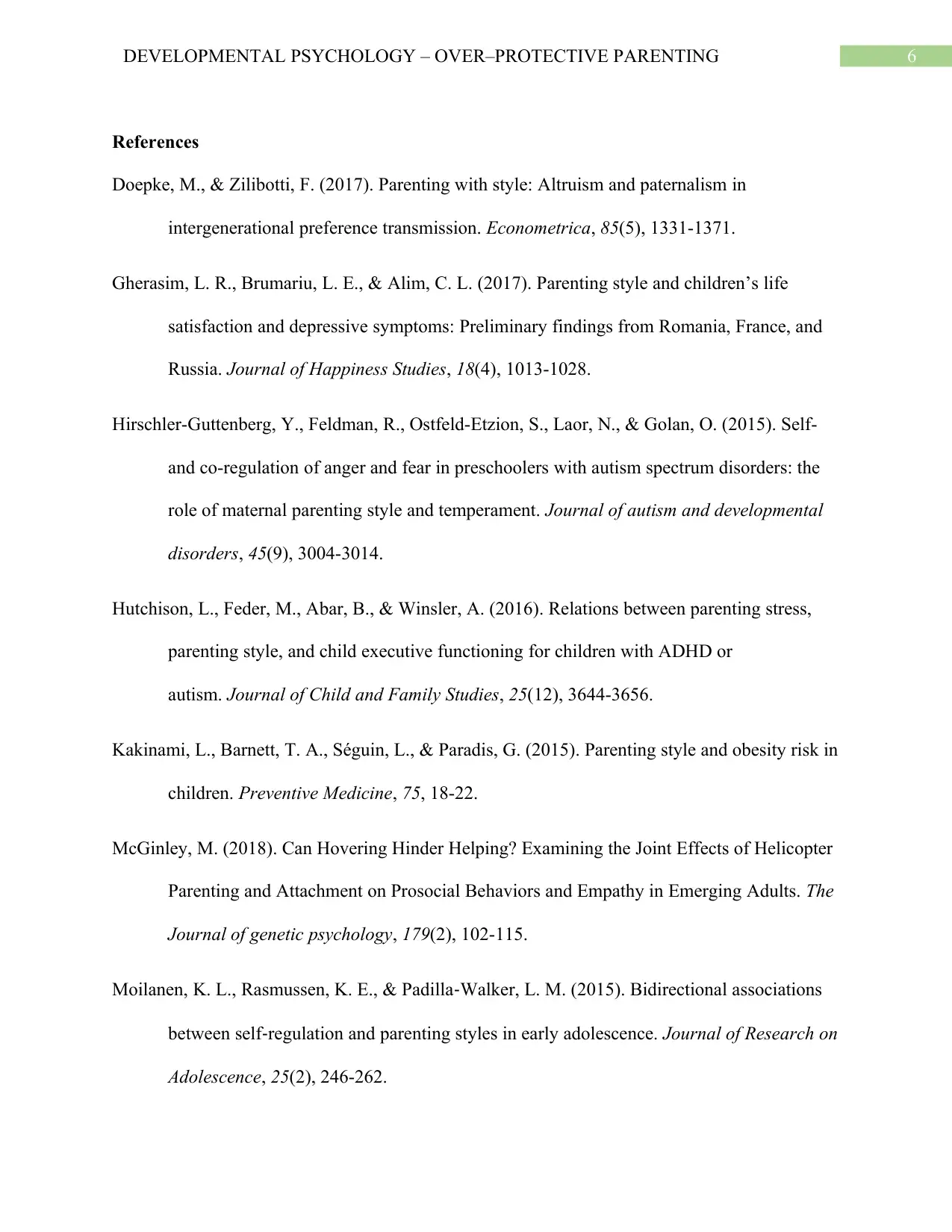
6DEVELOPMENTAL PSYCHOLOGY – OVER–PROTECTIVE PARENTING
References
Doepke, M., & Zilibotti, F. (2017). Parenting with style: Altruism and paternalism in
intergenerational preference transmission. Econometrica, 85(5), 1331-1371.
Gherasim, L. R., Brumariu, L. E., & Alim, C. L. (2017). Parenting style and children’s life
satisfaction and depressive symptoms: Preliminary findings from Romania, France, and
Russia. Journal of Happiness Studies, 18(4), 1013-1028.
Hirschler-Guttenberg, Y., Feldman, R., Ostfeld-Etzion, S., Laor, N., & Golan, O. (2015). Self-
and co-regulation of anger and fear in preschoolers with autism spectrum disorders: the
role of maternal parenting style and temperament. Journal of autism and developmental
disorders, 45(9), 3004-3014.
Hutchison, L., Feder, M., Abar, B., & Winsler, A. (2016). Relations between parenting stress,
parenting style, and child executive functioning for children with ADHD or
autism. Journal of Child and Family Studies, 25(12), 3644-3656.
Kakinami, L., Barnett, T. A., Séguin, L., & Paradis, G. (2015). Parenting style and obesity risk in
children. Preventive Medicine, 75, 18-22.
McGinley, M. (2018). Can Hovering Hinder Helping? Examining the Joint Effects of Helicopter
Parenting and Attachment on Prosocial Behaviors and Empathy in Emerging Adults. The
Journal of genetic psychology, 179(2), 102-115.
Moilanen, K. L., Rasmussen, K. E., & Padilla‐Walker, L. M. (2015). Bidirectional associations
between self‐regulation and parenting styles in early adolescence. Journal of Research on
Adolescence, 25(2), 246-262.
References
Doepke, M., & Zilibotti, F. (2017). Parenting with style: Altruism and paternalism in
intergenerational preference transmission. Econometrica, 85(5), 1331-1371.
Gherasim, L. R., Brumariu, L. E., & Alim, C. L. (2017). Parenting style and children’s life
satisfaction and depressive symptoms: Preliminary findings from Romania, France, and
Russia. Journal of Happiness Studies, 18(4), 1013-1028.
Hirschler-Guttenberg, Y., Feldman, R., Ostfeld-Etzion, S., Laor, N., & Golan, O. (2015). Self-
and co-regulation of anger and fear in preschoolers with autism spectrum disorders: the
role of maternal parenting style and temperament. Journal of autism and developmental
disorders, 45(9), 3004-3014.
Hutchison, L., Feder, M., Abar, B., & Winsler, A. (2016). Relations between parenting stress,
parenting style, and child executive functioning for children with ADHD or
autism. Journal of Child and Family Studies, 25(12), 3644-3656.
Kakinami, L., Barnett, T. A., Séguin, L., & Paradis, G. (2015). Parenting style and obesity risk in
children. Preventive Medicine, 75, 18-22.
McGinley, M. (2018). Can Hovering Hinder Helping? Examining the Joint Effects of Helicopter
Parenting and Attachment on Prosocial Behaviors and Empathy in Emerging Adults. The
Journal of genetic psychology, 179(2), 102-115.
Moilanen, K. L., Rasmussen, K. E., & Padilla‐Walker, L. M. (2015). Bidirectional associations
between self‐regulation and parenting styles in early adolescence. Journal of Research on
Adolescence, 25(2), 246-262.
Paraphrase This Document
Need a fresh take? Get an instant paraphrase of this document with our AI Paraphraser
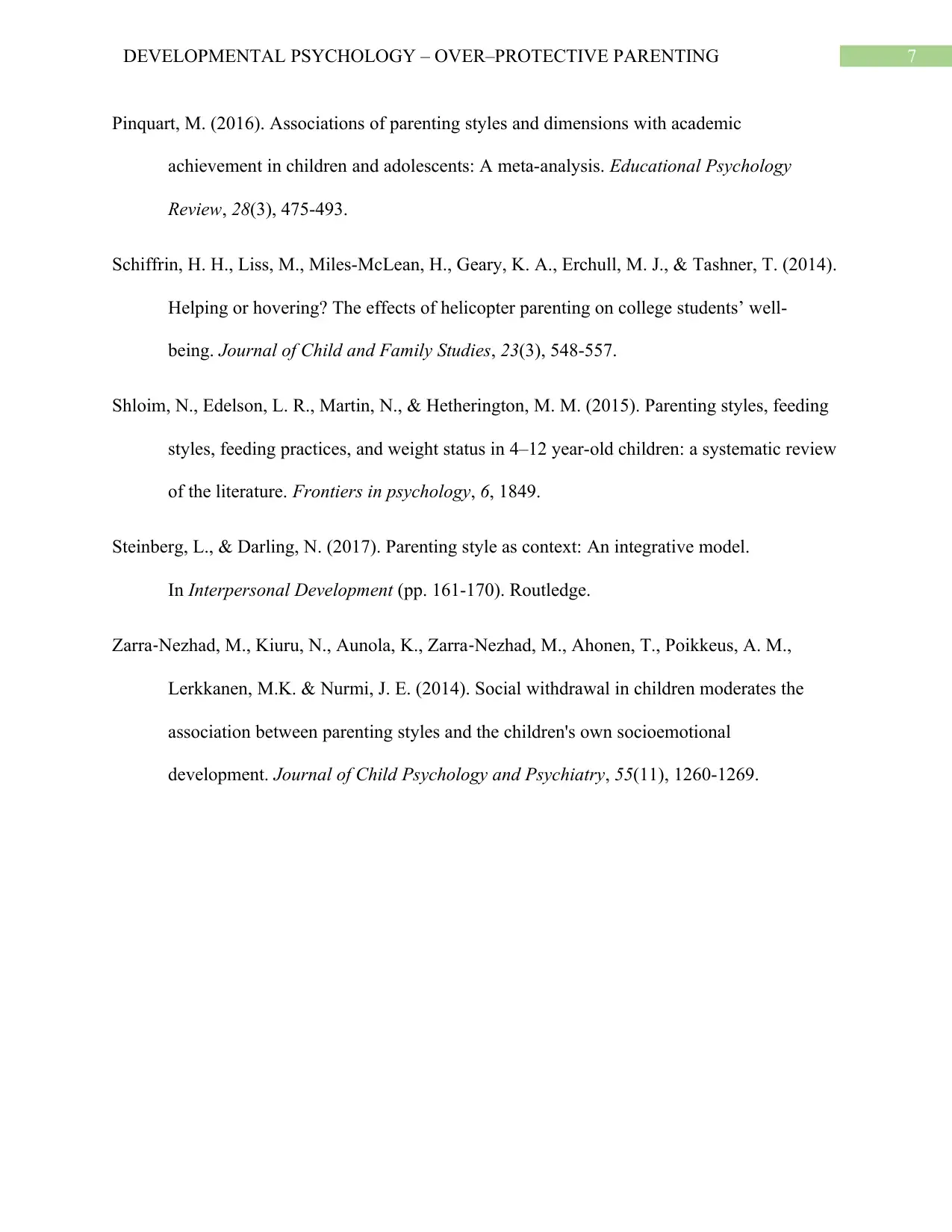
7DEVELOPMENTAL PSYCHOLOGY – OVER–PROTECTIVE PARENTING
Pinquart, M. (2016). Associations of parenting styles and dimensions with academic
achievement in children and adolescents: A meta-analysis. Educational Psychology
Review, 28(3), 475-493.
Schiffrin, H. H., Liss, M., Miles-McLean, H., Geary, K. A., Erchull, M. J., & Tashner, T. (2014).
Helping or hovering? The effects of helicopter parenting on college students’ well-
being. Journal of Child and Family Studies, 23(3), 548-557.
Shloim, N., Edelson, L. R., Martin, N., & Hetherington, M. M. (2015). Parenting styles, feeding
styles, feeding practices, and weight status in 4–12 year-old children: a systematic review
of the literature. Frontiers in psychology, 6, 1849.
Steinberg, L., & Darling, N. (2017). Parenting style as context: An integrative model.
In Interpersonal Development (pp. 161-170). Routledge.
Zarra‐Nezhad, M., Kiuru, N., Aunola, K., Zarra‐Nezhad, M., Ahonen, T., Poikkeus, A. M.,
Lerkkanen, M.K. & Nurmi, J. E. (2014). Social withdrawal in children moderates the
association between parenting styles and the children's own socioemotional
development. Journal of Child Psychology and Psychiatry, 55(11), 1260-1269.
Pinquart, M. (2016). Associations of parenting styles and dimensions with academic
achievement in children and adolescents: A meta-analysis. Educational Psychology
Review, 28(3), 475-493.
Schiffrin, H. H., Liss, M., Miles-McLean, H., Geary, K. A., Erchull, M. J., & Tashner, T. (2014).
Helping or hovering? The effects of helicopter parenting on college students’ well-
being. Journal of Child and Family Studies, 23(3), 548-557.
Shloim, N., Edelson, L. R., Martin, N., & Hetherington, M. M. (2015). Parenting styles, feeding
styles, feeding practices, and weight status in 4–12 year-old children: a systematic review
of the literature. Frontiers in psychology, 6, 1849.
Steinberg, L., & Darling, N. (2017). Parenting style as context: An integrative model.
In Interpersonal Development (pp. 161-170). Routledge.
Zarra‐Nezhad, M., Kiuru, N., Aunola, K., Zarra‐Nezhad, M., Ahonen, T., Poikkeus, A. M.,
Lerkkanen, M.K. & Nurmi, J. E. (2014). Social withdrawal in children moderates the
association between parenting styles and the children's own socioemotional
development. Journal of Child Psychology and Psychiatry, 55(11), 1260-1269.
1 out of 8
Related Documents
Your All-in-One AI-Powered Toolkit for Academic Success.
+13062052269
info@desklib.com
Available 24*7 on WhatsApp / Email
![[object Object]](/_next/static/media/star-bottom.7253800d.svg)
Unlock your academic potential
Copyright © 2020–2026 A2Z Services. All Rights Reserved. Developed and managed by ZUCOL.




